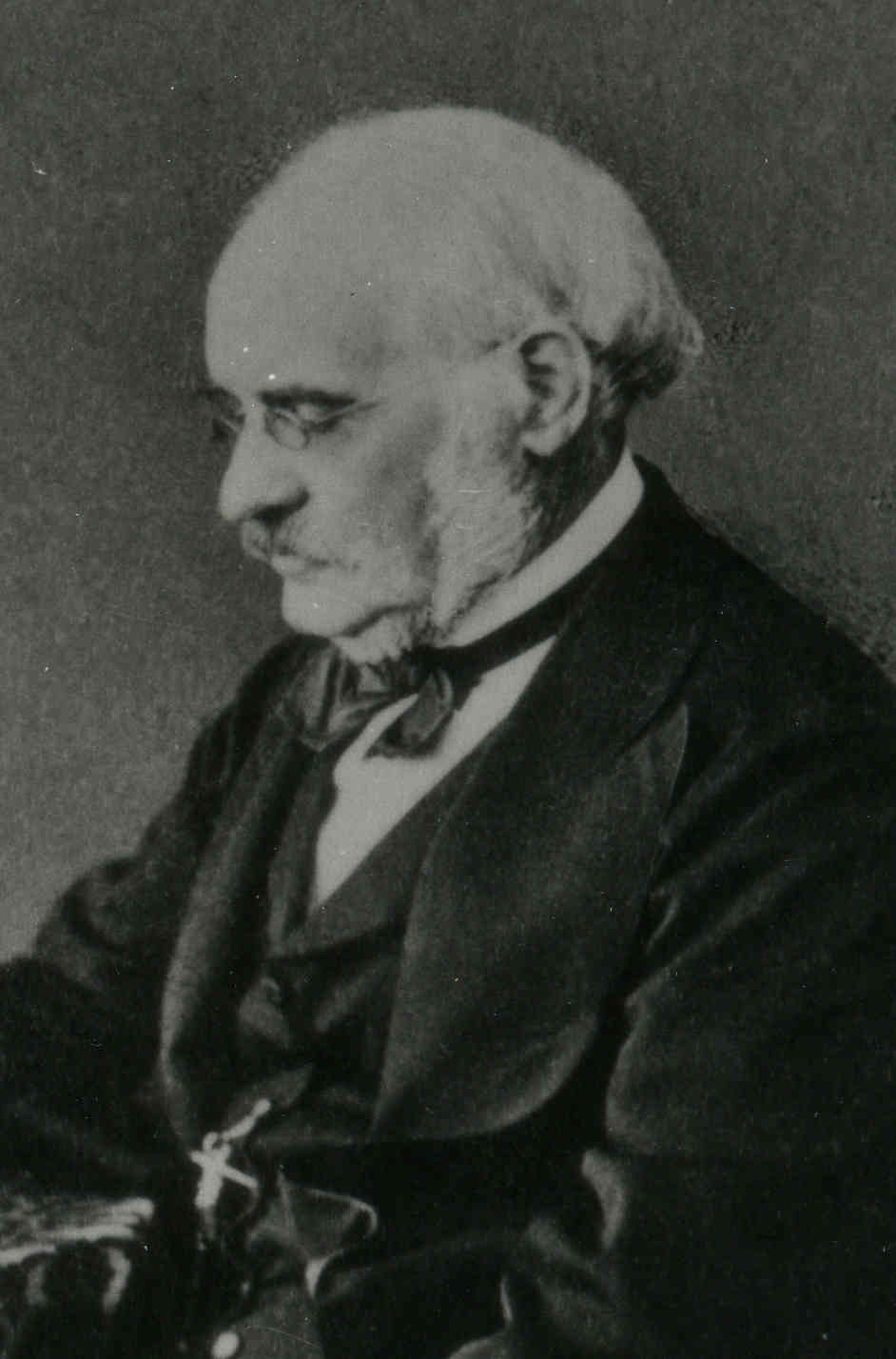
Georg Julius von Schultz (Schultz-Bertram)
Georg Julius von Schultz (nowadays known mostly as Schultz-Bertram, from his pseudonym Dr. Bertram, 4. X 1808 – 16. V 1875) was a Baltic German doctor, writer, commentator, folklore collector and an outstanding Estophile.
Schultz came from a preacher’s family whose ancestors had hailed from Mecklenburg. After his father’s early death he grew up with his grandfather on the Torma estate (therefore he sometimes used the name Schoultz de Torma). Between 1826 and 1833 he studied medicine at the University of Tartu and thereafter practiced in Russia. In 1845 he married Theodora Unzer (1820 – 1899). The couple moved to St. Petersburg, where they associated with the Estonian intelligentsia, including the circle of so-called St. Petersburg Patriots who were the initiators of the national awakening.
Schultz was one of the first to be active in collecting and researching Estonian folk poetry. As a friend of Friedrich Reinhold Kreutzwald he influenced the latter’s decision to write the Estonian epic Kalevipoeg, and at the author’s behest, translated one part of it into German.
In 1853 Schultz become Pro-Rector of the St. Petersburg Academy of Arts and a State Counsellor of Russia. Later he withdrew into private life, travelled through Europe and began his literary career under the name of Dr. Bertram. In Berlin he met Alexander von Humboldt, in Württemberg Justonis Kerner and Ludwig Uhland, in Paris Heinrich Heine and in Vienna Friedrich Hebbel. On his Vienna journey Schultz died. He was buried in Matzleinsdorf cemetery.
Schultz-Bertram’s satirical verses in Estonian in the collection Peegli pildid (‘Mirror Images’, St. Petersburg 1866) received severely negative criticism for their one-sidedness, under the conditions of the burgeoning national movement. The three-part work Ilmatar (Tartu 1870, in Estonian and German parallel text), in the old runic verse form, was based on elements of Estonian folk poetry. He made several attempts to write a great epic work in the runic verse (regivärss), but they were unsuccessful. For later generations the most interesting are his memoirs of youth in German, Baltische Skizzen (‘Baltic Sketches’ 1853-1855), Neue Baltische Skizzen (‘New Baltic Sketches’, 1872), especially the parts that describe Tartu student life in the eighteen-twenties, and the collection Wagien (Tallinn 1868), containing materials of ethnography, folklore and history from the Torma neighbourhood.
Schultz-Bertram’s daughters were the composer and music theoretician Ella Adaïewsky (1846 – 1926) and the artist Pauline Geiger (1851 – 1934). Pauline Geiger’s son was the Austrian poet, art historian and translator Benno Geiger (1882 – 1965).
L. P. (Translated by C. M.)
Books in German
Essays and memoirs
Der Strabismus, oder Erinnerungen aus dem Eilwagen. St. Petersburg: E. Goetz & Comp., 1851, 44 pp.
Baltische Skizzen. Erstes Bändchen, Funfzig Jahr zurück. Von Dr. Bertram. Dorpat: E. J. Karow; St. Petersburg: E. Götze, 1853, 83 pp. [Next eds: 1857, 1873, 1904, 1979.]
Baltische Skizzen. Zweites Bandchen, Funfzig Jahre zurück. Von Dr. Bertram. Dorpat; St. Petersburg: E. Götze, 1855, 95 pp. [Next eds: 1857, 1873, 1904, 1979.]
Dorpats Grössen und Typen vor vierzig Jahren. Von Dr. Bertram. Dorpat: W. Gläser, 1868, 73+43 pp.
Wagien: Baltische Studien und Erinnerungen. Von Dr. Bertram. Dorpat: W. Gläser, 1868, 156 pp.
Die Philosophie des guten Tons oder über Anstand in der Gesellschaft. Von Dr. Bertram. Dorpat: W. Gläser, 1869, 65 pp.
Dr. Bertram’s Gesammelte Schriften. Dorpat: W. Gläser, 1869-1870. [Next ed: Dorpat: Schnakenburg, 1875.]
Neue Baltische Skizzen. Von Dr. Bertram. Helsingfors: Wasenius, 1872, 130 pp.
Briefe eines baltischen Idealisten an seine Mutter 1833-1875. Leipzig: Koehler-Amelang, 1934, 304 pp. [2nd ed: 1972.]
Folklore
Jenseits der Scheeren, oder: der Geist Finnlands: eine Sammlung finnischer Volksmärchen und Sprichwörter. Von Dr. Bertram. Leipzig: Breitkopf & Härtel 1854, 75 pp.
Peivash Parnéh = Die Sonnensöhne. Nach Bruchstücken einer epischen Volkssage aus Lappland von Dr. Bertram. Helsingfors: Wasenius, 1872, 55 pp.
Sagen vom Ládogasee oder Erzählungen meiner Ssudomôika. Von Dr. Bertram. Helsingfors: Wasenius, 1872, 46 pp.
Poems
Bilder aus dem Süden. Von Dr. Bertram. Dorpat: W. Gläser, 1869, 76 pp. [2nd ed.]
Ilmatar, eine Commedia turanica. Estnisch und deutsch. Von Dr. Bertram. Dorpat: W. Gläser, 1870-1871, 276 pp.
Books in Estonian
Memoirs, correspondence, essays
Dr. Bertram, Kolm Tartu balli. Saksa keelest tõlkinud ja eessõna: Viktor Sepp. Tallinn: Perioodika [Loomingu Raamatukogu], 1990, 61 lk. [Väljavõtteid kirjadest emale jt. sugulastele.]
Dr. Bertram, Tartu tudengid viiskümmend aastat tagasi. Saksa keelest tõlkinud, kommenteerinud ja järelsõna: Viktor Sepp. Tallinn: Perioodika (Loomingu Raamatukogu), 1999, 72 lk.
Balti idealisti kirjad emale. Tõlkinud Ilmar Vene. Tartu: Ilmamaa, 2004, 367 lk. [Sari ‘Eesti mõttelugu’.]
Poems
Peegli pildid. Peterburi: E. Arnhold, 1866, 62 lk.
Lagle Leno laul. Tartu: W. Gläser, 1869, 4 lk.
Ilmatar, eine Commedia turanica. Estnisch und deutsch. Von Dr. Bertram. Dorpat: W. Gläser, 1870-1871, 276 pp.



